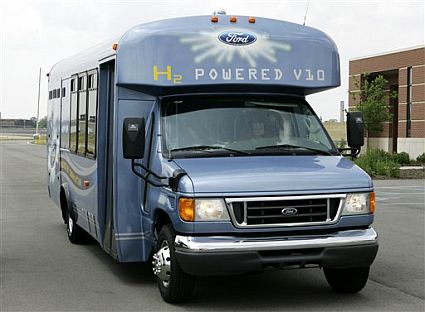
The best way to overcome the foreign oil dependence is to develop indigenous fuel. Now petrol cannot be developed in house so the best alternative is to use the most common element in the universe as a fuel.
Mostly all auto makers are working on technology that can use hydrogen as a fuel to power cars. Ford is doing the most in this field as the company has already shuttling passengers in a utilitarian 12-seater bus powered by a 6.8-liter internal combustion hydrogen engine. Ford officials also confirmed that this technology is fully developed and the company is close to mass produce such engines.
Ford’s 30 E-450 Hydrogen buses are working across the U.S. and Canada and the company officials are monitoring these in real time. These buses are powered by a modified internal combustion gasoline engine and have near zero emissions. The figure states near zero because these engines still make the use of lubricants which is the reason for some emissions.
Still we cannot term these engines as gas guzzlers because they provide up to 13% better fuel economy than their gasoline counterparts.
Hydrogen storage still a problem:
Ford has said pretty clearly that the company can mass produce these engines in the next five years if and only if the fuel storage problem is solved. Many in public fear that hydrogen is not one of the safest fuels and can explode in an accident. However, the U.S. Energy Department feels that hydrogen can be safe if stored safely.
Associated costs too high:
The internal combustion hydrogen engine still costs too much for all to afford. Even Ford has incurred the design costs and relies on partners to pay for the $250,000 buses. Moreover, the buses’ range is limited to 150-200 miles according to the fuel storage technology.
Bridge towards fuel cell vehicles:
The use of hydrogen can be expensive but once such engines are mass produced then the technology can come well under the budget. The same technology can further be used as a stepping stone to the ultimate Fuel Cell vehicles, which companies expect to develop by 2015. Fuel Cell vehicles will use hydrogen to produce electricity that further fuels an electric motor. Since they run on electricity, they are far more silent and all they emit as a waste is nothing but water.
Via: Huffingtonpost




